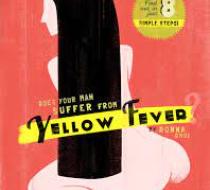Say No to "Yellow Fever" Favorite
New York artist Donna Choi wanted to create a “weird, memorable way” to discuss fetishization of Asian women, so she put together a satirical series about how to diagnose Yellow Fever—the specific obsession many Western men have with Asian culture.
The over-the-top series is a discussion of race crafted for the attention span of the Internet.
I emailed with Choi about her thinking behind the Yellow Fever series.
SARAH MIRK: Why did you decide to create this series? Were there specific events in your life that you were drawing on?
DONNA CHOI: I’ve always been interested in the intersection of love and race, two things that can be difficult to define and talk about. You can love someone but still internalize certain ideas about this person—be it based on race, gender, income level, family, etcetera. It’s very human, we’re all socialized to think this way. I think that acknowledging our inherent bias is the first step to overcoming it. But it’s especially hard to overcome when attempts at discussion are often met with that feel-good, willfully-blind mantra: “Everything’s fine, I voted for Obama! I don’t see race and neither should you.”
There’s that, and I also spend embarrassing amounts of time looking at cats falling off chairs and other amazing things on Buzzfeed and Reddit. So what if you combine that offbeat humor with a genuine desire to converse on a deeper level about race, power, and romance?
Is it hard to have these kinds of conversations in person? How does making this art compare to talking this over in person?
It can be hard to articulate without making accusations, especially if there’s feelings involved. I’m not interested in villainizing white men, or all men who date Asian women, or to say that Asian women have it the hardest. I think it’s a deeper issue than that.
On a personal level, making this series allowed me to explore my own thoughts on the issue and share my findings in a way that is meant to be entertaining and thought-provoking. This work also makes a more holistic argument than what I might make in person. I wanted to connect Asian fetish to a larger discussion about cultural commodification. For me, it’s not necessarily the attraction between Asian women and white men that’s the issue—after all, we all have preferences. Love is complicated and imperfect, so it’s absolutely not my place to judge.
The problem is the willful denial of race and privilege. Both of those things fundamentally affect how we perceive and treat others, and how others perceive and treat us. You can see it on a macro level in the relationship between the Western world and the developing world. And I believe that problematic dynamic takes root in the most simple, everyday circumstances- in a relationship between two people.
How did you decide how far to push these images? Are you worried that people won't get the joke and will just be offended by them?
I think that parody works best when you take it 200 percent to the extreme while making sure your message is really, really focused. It's shock value with a mission. I know how short my own attention span can be, so it was a priority for me to create imagery loud enough to compete with all of the gloriously lurid things happening simultaneously on the Internet.
I also really admire comedians and performers who can entertain while talking about dark, divisive issues. That's a beautiful, important skill. By the time the show is over, you don't know or even care that you've been schooled because you had such a good time. This approach makes difficult issues that much more accessible, and it's something that I admire and aspire toward.








